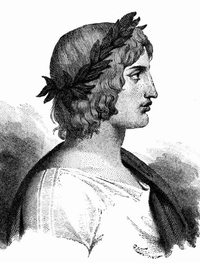
Throughout all the various cantos we have read during our exploration of Dante’s Inferno, Virgil has been a recurrent and important figure in Dante’s journey through hell; he is written by Dante to be a protective, grounded, and intelligent guide. His influence on Dante is very prominent in the poem but it is also incredibly important outside of the pages as well. Virgil or “Vergil” depending on the language was a very famous and inspirational poet living in the Roman Empire during the time of Cesar Augustus; his work has been incredibly influential but none more than Aeneid. Aeneid is an epic poem that details the story of Aeneas, the ancestor of the Romans; similarly to Dante’s trenches through the circles of hell, Aeneas adventures through what is called the “underworld” and encounters many beasts. Because of Dante’s admiration for Virgil and the similarities between the two poems, many scholars have come to the conclusion that Dante “seemed to use the Aeneid as a base and the parts which he did extract from the Aeneid, he carefully altered for his own purposes and beliefs.”[1] Dante looked to Virgil’s work as an important start to creating the Divine Comedy but also turned to God for help in creating his masterpiece. Dante himself admits his love and admiration for Virgils work in Inferno Canto I in lines 85-87 when Virgil appears from the wilderness and this love is present throughout Inferno as Dante blindly follows and trusts Virgil through Hell.
It is incredibly important to remember that Virgil died before the birth of Christ and thus, was not a Christian while Dante was obviously an incredibly religious and devoted Christian. According to this, it may seem like the “purposes and beliefs” that Dante adds to Aeneid to create the Divine Comedy would be Christian ones and that is mostly true; the entirety of the Divine Comedy was influenced and borrows ideas from the Bible and the established Christian church but that does not mean that Virgil’s influence doesn’t touch on the “Divine” part of the Divine Comedy. It is also widely accepted by many people, I’m assuming by Dante as well, that Virgil “was an anima naturaliter Christiana, a prophet who, in his Fourth Eclogue, foretold the birth of Christ”[2] The Fourth Eclogue was another one of Virgil’s great works that also had an immense impact on how Dante thought of Virgil; the fact that Virgil is shown in Inferno as a figure of great wisdom and intelligence(he was able to predict the birth of Jesus Christ as stated before) but not divine enough to enter into to Paradiso with Dante( he was stated to have died a pagan). Virgil is an indispensable part of Inferno and of the incredible work that is the Divine Comedy in general both as a character and as an influence on the work itself.


